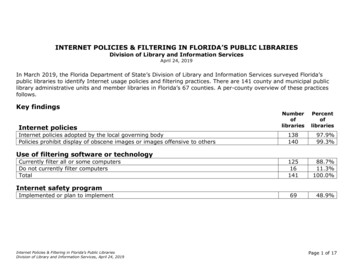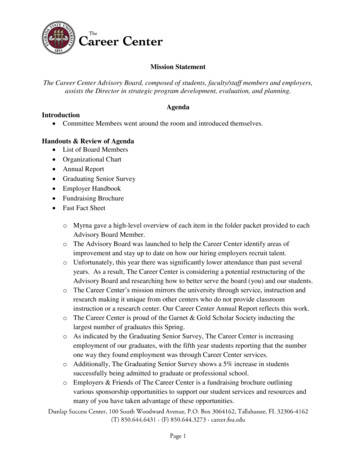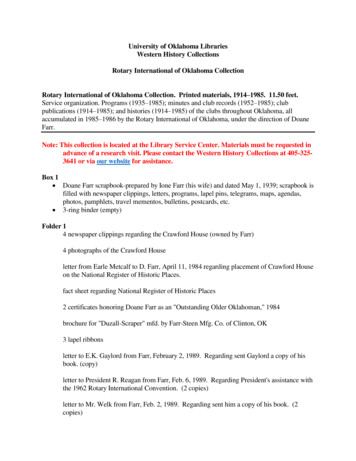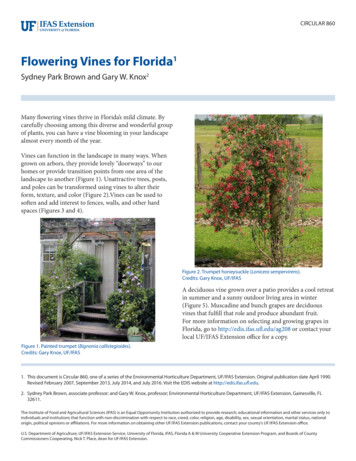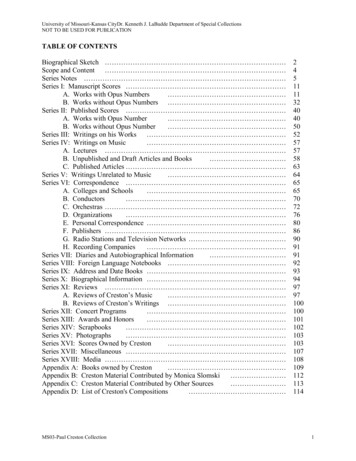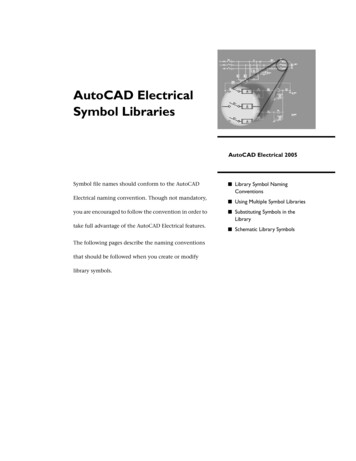
Transcription
Florida State University LibrariesFaculty PublicationsCollege of Social Work2013Motivations, Values, and ConflictResolution: Students' Integration of Personaland Professional IdentitiesPhilip OsteenFollow this and additional works at the FSU Digital Library. For more information, please contact lib-ir@fsu.edu
MOTIVATIONS 1Running head: MOTIVATIONS, VALUESMotivations, Values, and Conflict Resolution:Students Integration of Personal and Professional IdentitiesPhilip J. Osteen, PhDUniversity of Maryland - Baltimore
MOTIVATIONS 2AbstractEdicts within the CSWE 2008 EPAS address the importance of understanding the intersection ofpersonal and professional values. Twenty MSW students, chosen on the basis of diverse culturaland personal characteristics, were interviewed about their motivations for pursuing a MSWdegree and their personal and professional values. Thematic analysis yielded an emergent modelrelating the intersection of multiple forms of motivation, encountering and resolving valueconflicts, and integrating personal and professional identities. Implications for education andpractice are: (1) The intersection of personal and professional identities should be explicitcomponents of curriculum; (2) Strategies for managing value conflicts should be an integral partof the curriculum; (3) The relationship between identity integration and practice needs to bedelineated.
MOTIVATIONS 3The field of social work is based on a distinct set of value premises which set it apartfrom other professional disciplines (Abbott, 2003; Compton & Galloway, 1999; D’Aprix,Dunlap, Abel & Edwards, 2004; Reamer, 1995). This difference between social work and otherhelping professions is evident in the educational emphasis on multiculturalism, specifically inregards to issues of privilege and oppression, the application of person-in-environment andconstructionist theories of the human experiences, and the importance of social justice as adefining value of the profession. The National Association of Social Workers (NASW) Code ofEthics (2008) explicitly delineates six core values of the profession: service, social justice,dignity and worth of the person, importance of human relationships, integrity, and competence.These core values reflect what is “unique to the profession” (Preamble, ¶ 4) and are presented asfundamental guidelines of the profession.Kelly, Alexander, and Cullinae (1986) posited that in order for an occupation to be aprofession, “the members must identify with it and its mission” (p. 6). The development of aprofessional social work identity arises out of growing “self-awareness” and a growingidentification with the roles, values, and ethics of the profession (Carpenter, & Platt, 1997).Although not intended as a prescription of global professional social work behavior, the NASWCode of Ethics is nonetheless meant to establish values, principles, and standards to guide socialworkers’ decision making and conduct (Purpose, ¶ 3). Even more specific are the Council onSocial Work Education Educational Policy and Accreditation Standards (EPAS, 2008),establishing in Section 2.1.1 the educational outcome, “Identify as a professional social workerand conduct oneself accordingly” (p. 3).
MOTIVATIONS 4The discourse on the role of value systems in the field of social work is becoming moreintense and contentious as ill-conceived notions of liberalism and conservatism straddle thesocio-political fence (Fram, & Miller-Cribbs, 2008). Some researchers have suggested the socialwork education selection process be reformed in order to admit suitable students with “desiredcharacteristics” (Gibbons, Bore, Monroe, & Powis, 2007, p. 211). Based on a review of theliterature, Gibbons et al. found that although most admission processes focused on academicsuitability, educators also felt that personal qualities and values played a role in students’eventual success as a social work practitioner. Among those qualities deemed “undesirable” wereintolerance and judgmental and opinionated attitudes (Miller & Koerin, 1998). Given theresources involved “both in class and in the field to deal appropriately with the few students whoare academically able but exhibit unsuitable personal qualities or inappropriate behavior”(Gibbons, et al., p. 210), and the potential for negative impacts on other students, faculty, fieldinstructors, agencies, and clients (Gibbons, et al.; Gray & Gibbons, 2002), the recommendationwas made to focus more on the “screening in” process of selecting appropriate students insteadof the “screening out” process for inappropriate students.Bisman (2004) has suggested that the emphasis of the social work profession is on theknowledge base of the profession, supplanting a focus on the values and mission of theprofession. One example is the current debate in the field over the degree of congruence betweenMSW students’ personal values and those of the profession, with evidence supporting claims thatthe personal value-bases of MSW students over the past 15 years are both divergent andconvergent in relationship to the values of the profession (Abell, & McDonell, 1990; AllenMeares, 2000; D’APrix et al., 2004). Some research findings suggest that MSW students aremore interested in pursuing careers in private clinical practice than in careers focusing on
MOTIVATIONS 5oppressed and impoverished populations, and that there is disparity between the values ofcontemporary students and those of the profession (D’Aprix et al.). These findings are in contrastto those of Abell and McDonell who reported that less than 25% of MSW students surveyedintended to go into private practice, and that these students remain “highly committed to theconcept of involvement with the disadvantaged” (p. 5), and express ongoing commitments toserving traditional social work client groups (Butler, 1990). Limb and Organista (2006) foundthat students’ attitudes towards, and commitment to, social work’s mission, as evidenced thoughpractice preferences and career motivations, were generally high and positive, and did notchange much over the course of the MSW program.Since the adoption of a set of values and their incorporation in practice are definitive ofthe professional social worker (Clark, 2006), these findings – more particularly those thatindicate substantial and continuing value divergences – are of fundamental importance to thefuture of the social work profession. This incongruence raises questions about whether or notvalues that might be held as a part of a personal identity interfere with or even prevent theadoption and practice of values that are at the core of a social identity, such as that of “socialworker.” Haynes (1999) argues that the social work profession should be “tolerant” of diverseopinions and beliefs regarding “some things, but not about its ideology” (p. 2).Archer (2001) posits that commitment to a social identity cannot exist without thesupport of overlapping values and beliefs at the level of personal identity, and when applied tosocial work, might suggest that anyone with personal values inconsistent with social work wouldnot pursue adoption of this professional identity. The prior research on this question suggests thatthe reality is more complex and indicates the need for exploration of the interactions betweensocial and personal identities. According to Wenger (2003), social identity is partially derived
MOTIVATIONS 6from engaging in the practice of the community to which one belongs or seeks to belong. Socialidentities are simultaneously developed, maintained, and constrained through participation in acommunity of practice. It is in the execution of practice, the learning, the mastery, and theapplication, that social identity is formed. It is these communities of practice (CoPs) that allowone to learn, adopt, and express a social identity through participation (Wenger, 1998).Social work education represents a formal learning trajectory established by the largercommunity of practice of social work. Newcomers are brought into the community and begin apath to full membership and participation. A substantial piece of the learning trajectory, and anecessary outcome for the social work profession, is the understanding and incorporation of thevalues and ethics of the profession in conjunction with adequate demonstration of these samevalues and ethics in practice (Council on Social Work Education (CSWE), 2008).The 2008 CSWE Educational and Policy Standards (EPAS) explicitly identify theimportance of professional values, the interpretation of these values, and the role of the academicinstitutions in modeling, teaching, and assessing the integration of these values into social workpractice. Educational Policy 1.0, Program Mission and Goals, reiterates the core values of theprofession as posited by the NASW and establishes them as the foundation of both explicit andimplicit curricula. Educational Policy 2.0, The Social Work Curriculum and ProfessionalPractice, specifies several educational outcomes related to identifying personal values andresolving conflicts with professional social work values. Although the establishment of theseoutcomes as requisites for membership and participation in the CoP of social work is a key stepin the professionalization of the discipline, there is no formalized mechanism for evaluating therelationship between these two value systems. This research explored the nature and context ofmotivations for participating in a social work community of practice (CoP) and the relationships
MOTIVATIONS 7between these different forms of motivations, personal value systems, professional social workvalues, and identity integration.MethodThis study utilized an exploratory, qualitative design to develop an emergentunderstanding of the relationship between MSW students’ personal and profession valuesystems, the types of value conflict students experience, the methods they employ to negotiatevalue conflicts, and the integration of personal and professional identities.ParticipantsParticipants consisted of students currently enrolled in a MSW program at a private,Midwestern university. An email describing the study was sent to all MSW students, andinterested students were asked to contact the researcher directly. A non-random, purposive,maximum variation sampling frame was used. Maximum variation sampling involves selectingparticipants who vary widely along dimensions of interest (Patton, 2001); dimensions of interestwere religious affiliation, age, gender, sexual orientation, race, and family SES.Interested students who did not identify with majority-group characteristics of beingCaucasian, heterosexual, and female, were automatically selected for participation. Interestedstudents who did identify with these majority-group demographics were further evaluatedaccording to age and religious affiliation and enrolled based on the overall contribution to themaximum variation of the sample. Purposive recruitment attempts were made to students knownto self-identify as male, non-Caucasian, and/or non-heterosexual. In line with Glaser and Strauss’(1967) idea of theoretical sampling, active recruitment of Advanced Students was initiated whena pattern encompassing differences between foundation students, advanced standing students,
MOTIVATIONS 8and concentration students began to emerge. Based on additional recruitment efforts, seven moreparticipants were enrolled, yielding a total sample of 20 interviewees. A summary of participantsby dimension of interested is provided in Table 1.At the time of the study, the researcher was a doctoral student and adjunct facultymember in the social work program. Nine of the participants were known prior to theirinvolvement in the study through enrollment in classes taught by the researcher. Students whowere currently enrolled in courses taught by the researcher were not eligible for participation inthe study, and the researcher was no longer an instructor at the school after the completion of thestudy.[Insert Table 1]ProcedureParticipants who were selected, consented, and enrolled, were then interviewed using asemi-structured interview protocol developed by the researcher. Key questions addressed factorsinfluencing the decision to pursue a MSW degree, congruence and conflict between personalvalues and professional social work values, and ascription to and integration of an identity as asocial worker. Core questions from the interview protocol are listed in Table 2. All participantswere interviewed by the researcher, on campus, in a private office. All interviews wereconducted face-to-face and were audio-taped for transcription. Interviews ranged in length from28 minutes to 75 minutes. Interviews were transcribed, coded, and analyzed by the researcher.[Insert Table 2]Analysis
MOTIVATIONS 9A thematic analysis strategy incorporating components of grounded theory was used inthis study. Data analysis was conducted concurrently with data collection by first coding eachindividual interview and then coding for patterns across interviews. Analysis began with line-byline open coding of the data and identifying and categorizing discreet elements such as keywords and phrases (Johnson & Christensen, 2004; Strauss & Corbin, 1998). As categories andproperties were identified, patterns of codes across interviews were developed based on thediscrete data identified during open coding (Johnson & Christensen).Open coding was followed by axial coding to begin delineating the various conditions ofthe identified categories (Strauss & Corbin, 1998). Patterns of codes were assessed for emergentthemes which were explored and interpreted. As each theme emerged, it was integrated into aconceptual model of relationships among the themes. NVIVO 8 (QSR, 2008) computer softwarewas used to facilitate coding and organization of interview data.Creswell (2007) defines “validation” as a “process” to “assess the ‘accuracy’ of thefindings, as best described by the researcher and the participants” (207). Glaser and Strauss(1967) suggested that the process of conducting a grounded theory study is, in and of itself, aform of validation, and, to use their terminology, establishes “credibility”. Glaser and Strausscontended that the credibility of the generated theory should be judged according to the strategiesused for collecting, coding, analyzing and presenting data, and in the way people interpret thetheory. Purposive sampling was used to maximize the diversity of experiences and perspectivesin the study, and a systematic process of collecting data through audio-recording was used. Draftcopies of results were sent to those participants who were directly quoted, and they were asked toconsider both the context in which their words were used and the meaning and interpretation
MOTIVATIONS 10given to those words by the researcher. Five participants responded to the author’s request forfeedback, and all agreed with the context and interpretation of their words.Results and DiscussionThe roles of personal and professional value systems as motivators and educationaloutcomes were woven throughout the students’ stories. For most students, personal valuesformed the foundation on which their decision to enter a MSW program was based. Valueconflicts were a common occurrence and illustrate the importance of personal values as well asthe role of social work education in establishing a professional value system. Given the centralityof values in the formation of both personal and professional identities, the resolution of thisconflict played a central role in identity integration. Following Miles and Huberman’s (1994)recommendation, a network display format was created to illustrate the relationships betweenthese emergent themes (Figure 1).Values and MotivationSupport for Archer’s (2000) beliefs about how the commitment to social action isinfluenced by personal identity and internal values was discovered in students’ stories of whythey enrolled in a MSW program. Specifically, all students acknowledged that their personalvalues undergird motivation based on a desire to help others, as well as motivation based onperceived congruence with the values of the profession. Identification of personal beliefs as aprimary source of motivation illustrates Archer’s theory of the importance of the internal self inrelationship to the external self.Desire to Help Others
MOTIVATIONS 11Every single participant identified their desire to help others and make a positivecontribution to society as the fundamental reason why they chose to enter the program. As oneparticipant explained “the ability to help people and the desire to help people overrides all otherthings.” This finding is consistent with previous research on students’ motivations for enteringsocial work (e.g., D’Aprix, et al., 2004) and supports Archer’s (2002) idea that “doing” developsout of “being”. “Being” is a person’s sense of his or her self; it is an individual’s core internalidentity. “Doing” is how an individual manifests his or her sense of self in the social world.Entering the MSW program provided individuals whose “being” included helping others anoutlet for expressing their sense of self by “doing” as a social worker.The desire to help others seemed to stem from multiple sources. Some students identifiedspecific events that shaped their desire to help others. These events seem to have crystallizedmore abstract and undefined feelings of wanting to “do something important, do somethinggood”. For some students, the desire to help others arose out of beliefs and values rooted inreligious traditions or spirituality. One young student, who considered herself devoutly religious,recalled,My teacher said ‘social work is professional Christianity’. We believe in helping. And sofor me it’s always been a very connected issue. It’s a religious part of what I believe;serving others, giving, trying and helping those who are less fortunate.For other students, the desire to help others developed out of beliefs and values instilledin them by their families. One student described the impact her parents had on her beliefssurrounding equality and justice as,I think both my parents are amazing people and value the same things. They just taughtus life is about people and not just about material success, but about relationships withother people; that you gotta do your best to help other people.
MOTIVATIONS 12Professional LegitimacyWhile the desire to help others was clearly important to all participants, it did not, in andof itself, explain the decision to pursue a graduate degree. Most students made a connectionbetween needing a graduate degree to “legitimately” engage in the practice of helping others.One participant stated, “I felt getting a MSW would open up a lot of avenues to what I want todo, to working with families and doing therapy, which you definitely need a higher degree for”.As stated by one participant “Right now I want to do social work, and I knew I had to get myMSW to anything, to do anything substantial.” These responses suggest that a graduate degreelegitimizes students’ capacity and ability to help others within a professional context throughcredentialing. The MSW degree is a minimum qualification for most social-work specific jobs,and a prerequisite for licensure. Consistent with Wenger’s (1998) earlier work on CoPs, theMSW program, and arguably any professional graduate program, is a “learning trajectory”through which participants acquire the requisite skills and knowledge to achieve legitimate andfull participation.Lave and Wenger (1991) describe participation as “a way of learning – of both absorbingand being absorbed in – the ‘culture of practice’” (p. 95). Social work education serves as alearning trajectory by which students are involved in legitimate peripheral participation as theyprogress through the curriculum and situated learning of their academic programs; through thisproc
Participants consisted of students currently enrolled in a MSW program at a private, Midwestern university. An email describing the study was sent to all MSW students, and interested students were asked to contact the researcher directly. A non-random, purposive, maximum variation sampling frame was used. Maximum variation sampling involves .
